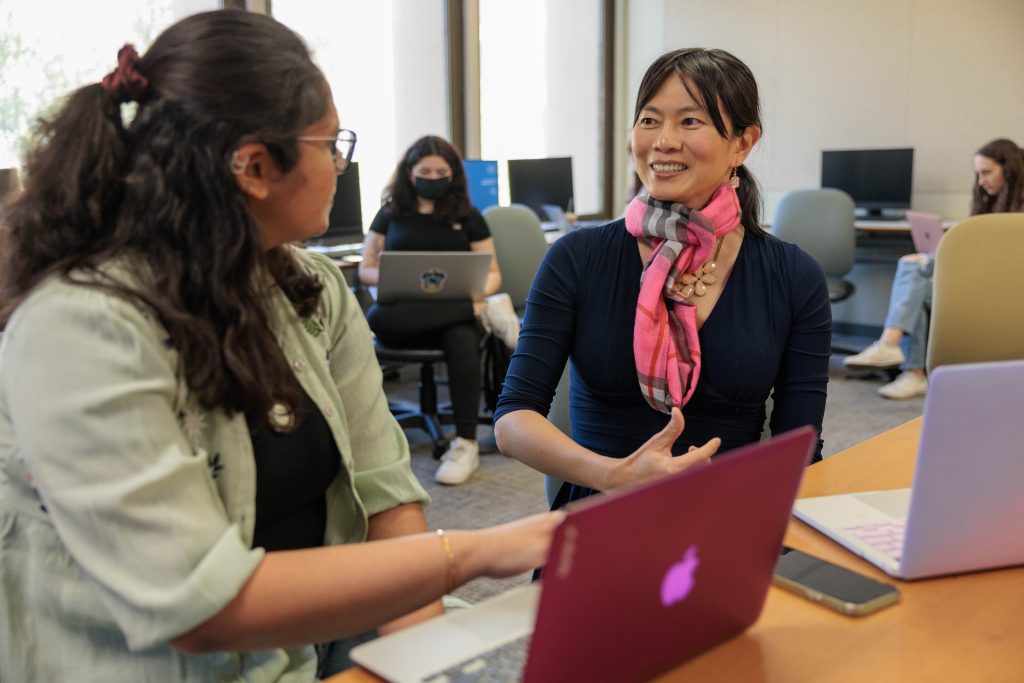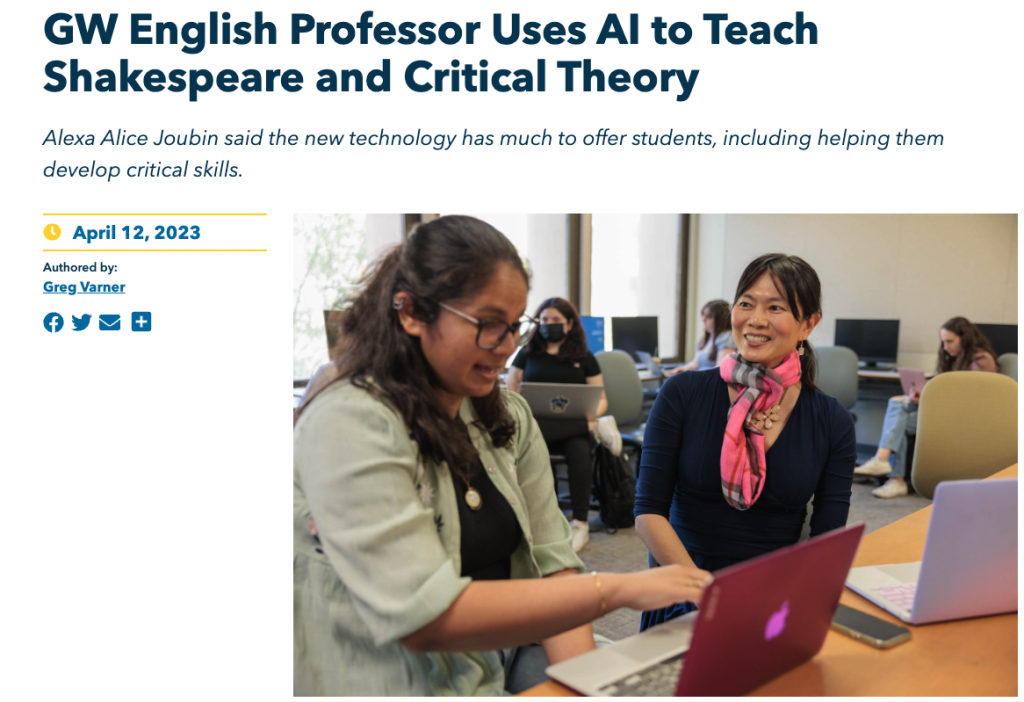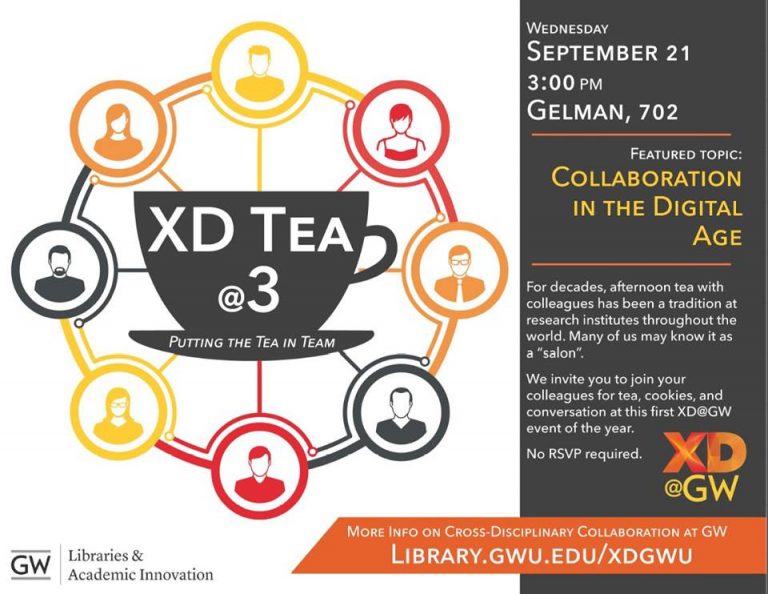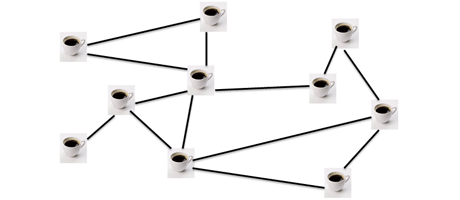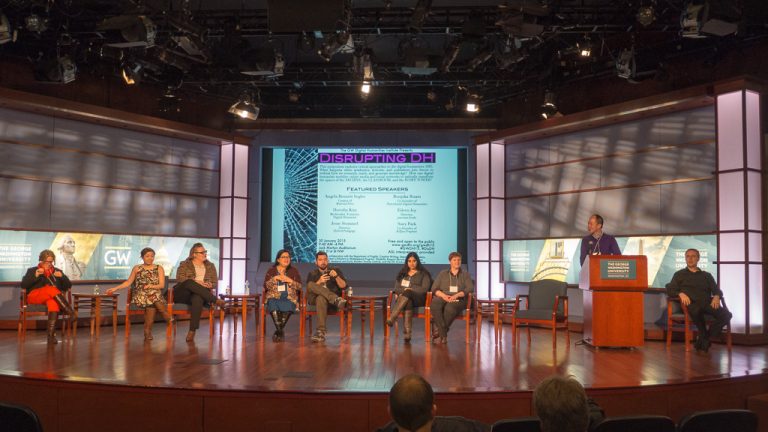Professor Uses AI to Teach Shakespeare and Critical Theory
GW Today news (Greg Varner), April 12, 2023
Summary: When ChatGPT was launched, Alexa Alice Joubin realized it was here to stay. She views it as her responsibility to teach students how to use it responsibly, not as a shortcut. “This technology is going to be with us, and students need employable skills in terms of curation, editorial repackaging and prompt engineering,” Joubin said. “They need to be able to formulate good queries—the quality of their queries is really important in this search-driven culture.” The skill to search for information and the ability to evaluate it are important assets in the job market and in life in general, Joubin said. “In our inquiry-driven culture, we need to know how to retrieve information through queries,” Joubin said. “Further, democratic society needs good question-askers as much as good problem-solvers. Asking key questions helps to advance scholarly fields, and students develop editorial, curatorial and critical questioning skills that are employable skills and the foundation of civil society in an era of ChatGPT.”
Generative artificial intelligence (AI) is more than “a cool digital tool to play with,” said Alexa Alice Joubin, professor of English, international affairs, theatre and dance, and East Asian languages and literatures in the Columbian College of Arts and Sciences. She is the founding co-director of the Digital Humanities Institute and is also the inaugural recipient of the bell hooks Legacy Award in 2023.
Joubin uses ChatGPT and Packback, a new instructional AI platform that is available around the clock to evaluate student work and help them enhance their skills. Generative AI platforms, such as Midjourney and ChatGPT, produce output (images or text) in response to prompts, while instructional tools such as Packback “work in the background to help students write better,” Joubin said.
Using Packback, students formulate research questions and then write a short essay responding to their own query. Packback can give them feedback on the quality of their question: Is it open-ended or closed? Does it have depth? Response essays are rated for criteria such as credibility of sources cited, organization of arguments and grammatical correctness.
A sample question might be “How does this film of ‘Romeo and Juliet’ depict gender dynamics?” This example is specific, open-ended and has conceptual depth, whereas a question such as “Is Shakespeare racist?” is a less helpful starting point. Packback proposed alternate versions of that question more likely to lead to substantive learning. One example: What evidence is there to suggest that Shakespeare was racist?
While AI can help students answer their own questions, Joubin said, it’s important to remember that the tool is not a subject area specialist.
“AI is merely the first layer,” Joubin said. “And it is a great assistive technology. I teach students for whom English is not their first language, who have things to say but are not able to participate as fully as native English speakers. There are also students with accommodation needs—students with dyslexia, for example. The assistive technology can enable everyone. I, of course, have a role to play as well.”
Packback shares some features of social media, in which posts are public, which Joubin said increases student engagement.
“I can give feedback on their posts, and I can moderate a post if it’s really bad, and it would disappear from public view,” she said. “If I praise a post, it’s public. Writing for a community really improves student writing, because they’re not writing for me alone.”
When she responds to a student’s writing on Packback, she writes a headline, and then the body of her response, just as students do—even citing sources. Thus, she models the behavior she is helping students to learn. Students also respond to each other’s post.
Last fall, when ChatGPT was launched, Joubin realized it was here to stay. She views it as her responsibility to teach students how to use it responsibly, not as a shortcut.
“This technology is going to be with us, and students need employable skills in terms of curation, editorial repackaging and prompt engineering,” Joubin said. “They need to be able to formulate good queries—the quality of their queries is really important in this search-driven culture.”
The skill to search for information and the ability to evaluate it are important assets in the job market and in life in general, Joubin said.
“ChatGPT is not reliable,” she said, “but it’s a very good buddy to practice ‘tennis’ with. When we work in small groups to review each other’s writing, human psychology can become a problem. Do you really dare say anything somewhat negative to your friend?”
Alexandra Sengupta, the graduate teaching assistant in Joubin’s Introduction to Critical Theory class, said her assessment is that using the new technology has been a positive experience for all concerned and praises Joubin’s ability to embrace technological change.
“She understands how important it is to be aware of and value changing media and forms of art because she is deeply involved in Shakespeare and film adaptation,” Sengupta said. “She takes this philosophy of embracing change into the classroom. These tools can help students reach a higher level of discourse.”
Anais Fang, a student in Joubin’s Shakespeare on Film class, said she has enjoyed working with the new tools and believes she has benefited from their use.
“Dr. Joubin’s class is far more interactive and engaging than other courses I have taken,” Fang said, “not only because of the content, but also because of the various innovative tools she employs to enhance our learning experience. I find myself often making small grammatical errors that I would not have noticed without the feedback that Packback provides.”
Additionally, Fang said, “Since Packback requires that each discussion post includes a citation source, I find myself writing and submitting even small assignments in a more thorough and academic manner.”
Currently, Joubin said, the academic consensus view is that ChatGPT produces mediocre college-level writing. Because teaching is a creative profession, she believes that AI will never replace human teachers.
“Always remember,” she said, “the invention of the calculator did not kill accounting as a profession.” She advises colleagues to start by acknowledging the presence of ChatGPT and to clearly tell students what the approved uses of the tools are in each class. (The university is planning to issue guidance soon regarding the use of AI in connection with graded coursework.)
“In our inquiry-driven culture, we need to know how to retrieve information through queries,” Joubin said. “Further, democratic society needs good question-askers as much as good problem-solvers. Asking key questions helps to advance scholarly fields, and students develop editorial, curatorial and critical questioning skills that are employable skills and the foundation of civil society in an era of ChatGPT.”
Dr. Joubin will moderate one of the panels at a symposium on the future of AI and the humanities, “I Am Not a Robot,” to be held on the GW campus on Friday, April 14. Experts will present their views of AI from philosophical, moral and cultural standpoints, and will assess AI’s past and future.

